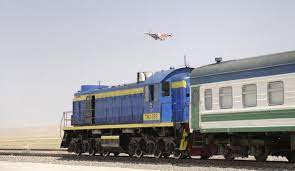Uzbekistan-Afghanistan-Pakistan-Railway Project
High-level international conference on regional connectivity in Tashkent exhibits the zeal and zest for global trade and commerce with Central Asia. Pakistan, Afghanistan and Uzbekistan have already signed a US$ 4.8 billion railway project that is likely to bolster trade relations between Pakistan and South Asia.The proposed rail link with track length of 573-km, would connect Uzbekistan’s capital Tashkent through Afghanistan’s capital Kabul and Peshawar in Pakistan. The project is being viewed in Uzbekistan as the “event of the century”, since it is aimed at improved regional trade and connectivity by offering landlocked Central Asia, a direct access to Pakistan’s Arabian Sea ports. This connectivity corridor is also known as Trans-Afghan railway line ‘Mazar-e-Sharif-Kabul-Peshawar project.
The trilateral project would include both high-speed passenger and cargo trains. The railway linkis going to be financed by the World Bank with a loan of US$ 4.8 billion.Ever since independence of Central Asian Republics (CARs) in 90s from the erstwhile USSR, Pakistan has been mindful of the significance of intimate relations with the CARs for regional connectivity, trade and commerce. Therefore, a number of initiatives in the form of US$ 1.16 billion CASA-1000 Project for export of surplus hydro electricity from Kyrgyzstan & Tajikistan to Afghanistan and Pakistan;US$ 10 billion TAPI natural gas 1814-km pipeline projectfor gas energy from Turkmenistan to Afghanistan, Pakistan and India; Quadrilateral Traffic and Transit Agreement (QTTA) among Pakistan, China, Kyrgyzstan and Kazakhstan providing an effective connectivity network between Central Asia and Gowadar port;and Pakistan Stream Gas Pipeline (PSGP) a flagship project of Pak-Russia strategic partnership involving construction of 1122 KM high pressure gas transmission pipeline from Port Qasim, Karachi to Kasur in Punjab province, have been undertaken by Pakistan.
Pakistan-Afghanistan-Uzbekistan Railway project is also a natural sequence of the regional connectivity cherished by Pakistan and Uzbekistan. Once the project is fully functional, the following impact on regional connectivity can be anticipated.

